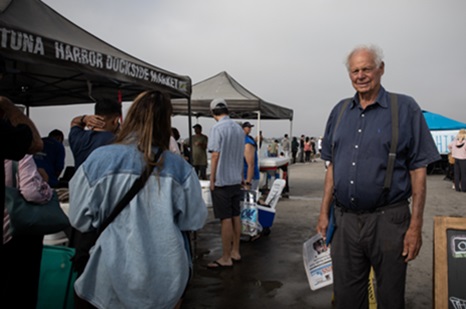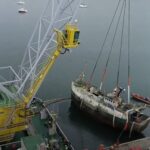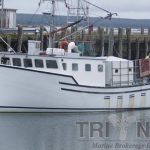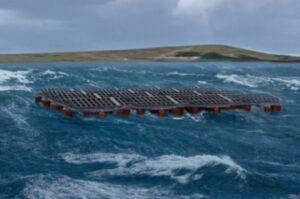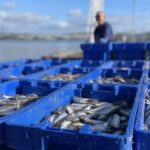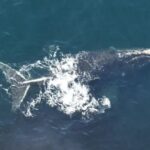Tag Archives: San Diego
Local fishermen fight for survival and infrastructure in changing San Diego waters
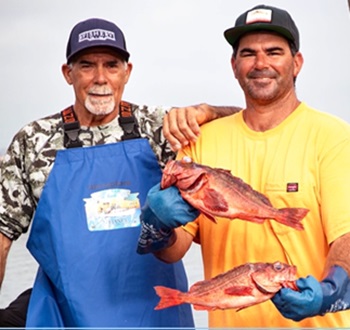 In the early morning hours, as most San Diegans prepare for their daily commute, Mario and Jordan Souza set out on a different kind of journey. The father-son duo boards their boat, the Extremis, to continue a family tradition that spans generations. “Welcome to the office,” Mario says as he gestures to their vessel and the vast expanse of the Pacific Ocean stretching out before them. The Souza’s story is about resilience, adaptability, and a deep-rooted passion for the sea. Jordan, who started in the fishing industry at the age of eleven, recalls his father taking him fishing as a toddler. They come from three generations of fishermen and remember the glory days of San Diego’s fishing industry well. Photos, Video, more, >>CLICK TO READ<< 09:09
In the early morning hours, as most San Diegans prepare for their daily commute, Mario and Jordan Souza set out on a different kind of journey. The father-son duo boards their boat, the Extremis, to continue a family tradition that spans generations. “Welcome to the office,” Mario says as he gestures to their vessel and the vast expanse of the Pacific Ocean stretching out before them. The Souza’s story is about resilience, adaptability, and a deep-rooted passion for the sea. Jordan, who started in the fishing industry at the age of eleven, recalls his father taking him fishing as a toddler. They come from three generations of fishermen and remember the glory days of San Diego’s fishing industry well. Photos, Video, more, >>CLICK TO READ<< 09:09
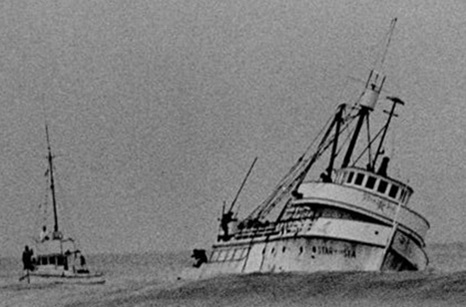
How a few daring moves saved the crew of the Star of the Sea tuna boat in a 1961 accident
In the predawn hours of Oct. 4, 1961, a tuna clipper en route to San Diego ran aground off Point Arena in dense fog. The 108-foot Star of the Sea — with an 11-man crew and 160 tons of tuna aboard — was returning from a nine-week fishing voyage near Newport, Oregon. As it arrived in the small coastal city of Point Arena, between Sea Ranch and Manchester in Mendocino County, the vessel’s navigational system went out amid unnavigable fog and turbulent waters. The Oct. 4, 1961, Oakland Tribune reported the crew fought to control the ship, then the captain, identified as Andrew Baity, deliberately grounded it on sand to prevent it from smashing into nearby rocks. With the vessel’s two dories lost in the heavy sea and no immediate rescue on the way, the crew was stuck and helpless. Then, crewman John Dutra made a dramatic pursuit for aid. photo gallery, more, >>CLICK TO READ<< 10:07
New partnership delivers locally caught seafood to San Diegans in need
 San Diego Fishermen’s Working Group (SDFWG) and Jacobs & Cushman San Diego Food Bank have established a partnership to provide fresh fish caught by local fishermen for families and individuals experiencing food insecurity in San Diego. Through February 2025, the collaboration will expand the Food Bank’s offerings, ensuring that more San Diegans have access to nutrient-dense seafood. “We want all San Diegans to enjoy locally sourced seafood, and partnering with the San Diego Food Bank creates that opportunity,” said Pete Halmay, president of the SDFWG and longtime San Diego commercial fisherman. “Our hardworking fishermen look forward to supporting the community with healthy, sustainable food for their families. Plus, buying local seafood leads to a shorter supply chain, reduces our carbon footprint, and provides the healthiest fish.” more, >>CLICK TO READ<< 06:28
San Diego Fishermen’s Working Group (SDFWG) and Jacobs & Cushman San Diego Food Bank have established a partnership to provide fresh fish caught by local fishermen for families and individuals experiencing food insecurity in San Diego. Through February 2025, the collaboration will expand the Food Bank’s offerings, ensuring that more San Diegans have access to nutrient-dense seafood. “We want all San Diegans to enjoy locally sourced seafood, and partnering with the San Diego Food Bank creates that opportunity,” said Pete Halmay, president of the SDFWG and longtime San Diego commercial fisherman. “Our hardworking fishermen look forward to supporting the community with healthy, sustainable food for their families. Plus, buying local seafood leads to a shorter supply chain, reduces our carbon footprint, and provides the healthiest fish.” more, >>CLICK TO READ<< 06:28
After 32 years of family ownership, Point Loma’s commercial fishing marina drifts toward a port takeover
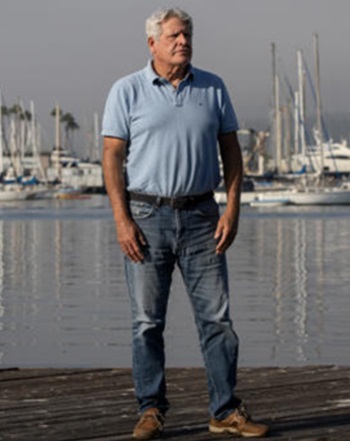 Tom Driscoll’s commercial fishing wharf at the north eastern tip of America’s Cup Harbor in Point Loma is falling apart. The marina’s four, fixed piers — home to as many as 120 fishing boats in their prime — appear to be on the brink of collapse. The business model gave way long ago. The substandard conditions will remain suspended in time until the Port of San Diego assumes control of the facility at some future date. The agency is pushing Driscoll out of the marina that has held the family name for 32 years, but also forcing him to stay put for now. Port commissioners considered and rejected two formal redevelopment proposals from Driscoll, the first in 2017 and the other in 2022. Then, in late 2022, the agency declined to renew Driscoll’s lease, opting instead to move forward with its own takeover and redevelopment plan for what it’s now calling the Shelter Island Commercial Fishing Wharf. more, >>CLICK TO READ<< 13:39
Tom Driscoll’s commercial fishing wharf at the north eastern tip of America’s Cup Harbor in Point Loma is falling apart. The marina’s four, fixed piers — home to as many as 120 fishing boats in their prime — appear to be on the brink of collapse. The business model gave way long ago. The substandard conditions will remain suspended in time until the Port of San Diego assumes control of the facility at some future date. The agency is pushing Driscoll out of the marina that has held the family name for 32 years, but also forcing him to stay put for now. Port commissioners considered and rejected two formal redevelopment proposals from Driscoll, the first in 2017 and the other in 2022. Then, in late 2022, the agency declined to renew Driscoll’s lease, opting instead to move forward with its own takeover and redevelopment plan for what it’s now calling the Shelter Island Commercial Fishing Wharf. more, >>CLICK TO READ<< 13:39
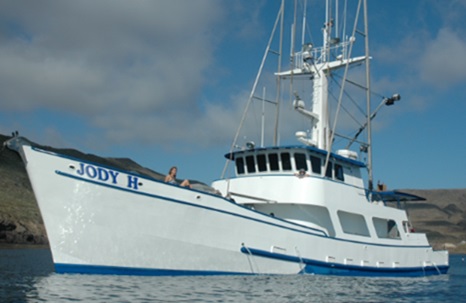
Climate change forces 3rd gen fisherman to rethink this year
Every June, fisherman Scott Hawkins and his small crew set sail from a marina in San Diego and travel hundreds of miles, scouring the water, hoping for a good catch of albacore tuna. It can take hours or days to stumble upon a school of them. But when they do, everyone springs into action at once. The men grab fishing poles taller than they are, stand in a row on the edge of the boat and cast their lines into the water. Every few seconds, one of them pulls up a fat, two-foot-long albacore tuna and hoists it over his shoulder onto the pile. Every thud is another one landing atop the dozens already flapping on deck. They do this 17 hour per day for five months. “It’s the exact same that my grandfather did in the 50s,” Hawkins says. But this June, the boat isn’t leaving the marina. more, >>CLICK TO READ<< 15:16
San Diego fishermen fined for poaching
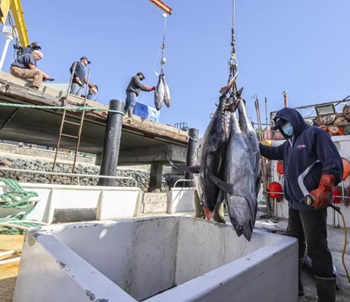 State Department of Fish and Wildlife officials have fined a network of San Diego fishermen a total of $145,000 for poaching bluefin tuna, yellowtail and mahi mahi. A six-month investigation showed more than 5,500 pounds of fish were bought from recreational fishermen and sold in commercial markets, according to a recent news release from the department. Nick Haworth, 28, pleaded guilty and agreed to community service and a $10,000 fine, the release states. His father, David Haworth, 60, agreed to community service and to host six events feeding fish meals to the homeless through a local food bank. The Haworths participate in the Tuna Harbor Dockside Market near Seaport Village and have sold fish at their dock at Driscoll’s Wharf in Point Loma and with home deliveries. Others involved include, more, >>click to read<< 18:45
State Department of Fish and Wildlife officials have fined a network of San Diego fishermen a total of $145,000 for poaching bluefin tuna, yellowtail and mahi mahi. A six-month investigation showed more than 5,500 pounds of fish were bought from recreational fishermen and sold in commercial markets, according to a recent news release from the department. Nick Haworth, 28, pleaded guilty and agreed to community service and a $10,000 fine, the release states. His father, David Haworth, 60, agreed to community service and to host six events feeding fish meals to the homeless through a local food bank. The Haworths participate in the Tuna Harbor Dockside Market near Seaport Village and have sold fish at their dock at Driscoll’s Wharf in Point Loma and with home deliveries. Others involved include, more, >>click to read<< 18:45
Podcast: The Fishmonger Tommy Gomes Returns With Dry-Aged Fish
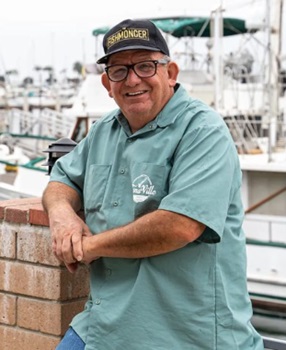 These days, Gomes runs TunaVille, a seafood shop at Driscoll’s Wharf in San Diego Harbor that serves local, only. It opened last May. The fish is caught by residents on city boats and is delivered 10 feet away to the storefront. “It never sees the back of a truck, our fish,” Gomes says in the episode. Tunaville is a partnership with another fisherman and local seafood icon, Mitch Conniff of Mitch’s Seafood, and a handful of other local fishing families who have bought in. Restaurants like Herb & Wood, Solare, and Juan Jasper, for example, are clients, sourcing their treats from the sea from Gomes. more, click to read/listen o7:43
These days, Gomes runs TunaVille, a seafood shop at Driscoll’s Wharf in San Diego Harbor that serves local, only. It opened last May. The fish is caught by residents on city boats and is delivered 10 feet away to the storefront. “It never sees the back of a truck, our fish,” Gomes says in the episode. Tunaville is a partnership with another fisherman and local seafood icon, Mitch Conniff of Mitch’s Seafood, and a handful of other local fishing families who have bought in. Restaurants like Herb & Wood, Solare, and Juan Jasper, for example, are clients, sourcing their treats from the sea from Gomes. more, click to read/listen o7:43
Fish to Families: San Diego fishermen and chefs team up to fight hunger
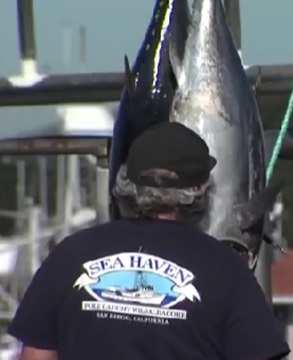 An innovative program called “Fish to Families” has local fishermen and chefs teaming up to help San Diegans struggling with hunger. The San Diego Fishermen’s Working Group originally spearheaded the program in 2020 to help both the community and the fishermen since the restaurants were shut down. “We were able to work, and they were able to put a high-quality meal for somebody less fortunate, and it blossomed from there,” Arthur Lorton, owner and operator of the “Sea Haven” fishing boat, said. The program was recently restarted, thanks to a grant from The Parker Foundation, to help the growing number of people in need. Video, >>click to read<< 09:26
An innovative program called “Fish to Families” has local fishermen and chefs teaming up to help San Diegans struggling with hunger. The San Diego Fishermen’s Working Group originally spearheaded the program in 2020 to help both the community and the fishermen since the restaurants were shut down. “We were able to work, and they were able to put a high-quality meal for somebody less fortunate, and it blossomed from there,” Arthur Lorton, owner and operator of the “Sea Haven” fishing boat, said. The program was recently restarted, thanks to a grant from The Parker Foundation, to help the growing number of people in need. Video, >>click to read<< 09:26
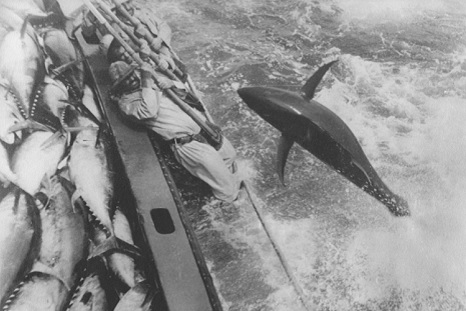
TUNAVILLE – Point Loma’s proud Portuguese past, and present
The Point Loma boundaries of Lowell to Talbot streets, and as high up the peninsula as Willow Street, by the 1930s, had earned the moniker “Tunaville.” Here has been home to an immigrant Portuguese populace settled as far back as 1885, and by the 1940s had become a bustling tuna fishermen’s haven. Early Portuguese fishing settlements grew along the base of Kellogg and McCall streets in La Playa and Roseville. Interestingly, the natural tidelands at the time meandered as far inland as today’s Scott Street. “In remarkably short order, each fisherman owned his own dory. photos, >click to read< 14:58

32 years later, investigators continue searching for answers in murder of Joseph Fernandes
It has now been 32 years since San Diego resident Joseph Fernandes was brutally murdered aboard a tuna boat docked at the G Street Pier and the case remains cold.“He’s never far from my thoughts,” said Mary Montgomery, Fernandes’ granddaughter. “I do have a sense of peace when I’m near the water.” Fernandes was 69 years old, the retired fisherman was working as a night watchman aboard the Sea Quest Tuna Boat, which was docked at the G Street Pier. As night fell between July 7th and 8th 1990, Fernandes would take his last breath on that boat. >click to read< 16:30

Commercial Fisherman Peter Buompensiero of San Diego has passed away
Peter Buompensiero passed away peacefully in Las Vegas, Nevada, on December 2nd, 2021. Peter was one of three children and the oldest son of John Buompensiero and Nina Venezia Buompensiero. Peter grew up in San Diego’s Little Italy. He loved to go down to his dad’s small fishing boat, the F/V Rosalia Madre and developed a love for the sea. He spent many years as a cook in the United States tuna fleet. He worked with Champ Brenha on the F/V Viking, with Frank Souza on the bait boat F/V Mary S, with George Souza on the seiners F/V Lusitania and F/V Mary S, and with Joe Finete on the M/V Jeanette Diana. In his later years, Pete worked with his long-time shipmate and cousin Joe Anfuso on the F/V Acoustic Explorer before retiring and relocating to Las Vegas. >click to read< 12:55

Louis Harlow Nielsen June 25, 1930 – June 14, 2021 Oceanside, Ca.
Louis Harlow Nielsen was born at home during a dust storm on June 25th, 1930 in Manson Ia. Louis Nielsen began his life during the Great Depression. When he was two years old, the family moved to New Hampshire They settled in Portsmouth where Lou spent his early boyhood in a tribe of rag-a-muffins now known as the “Puddledock Kids.” After Lou’s father left, it became necessary for the children to find work, so seven year-old Lou got a job delivering newspapers. Fortunately the young boy found a job working for the Marconi family. Babe Marconi hired the nine year-old Lou, as a lobster lad to help out on his boat, but it was Babe’s wife Rose, who made certain the boy received a good breakfast every morning before setting out to sea. >click to read< 12:33

Podcast: Want to support San Diego’s shrinking local commercial fishing industry?
Tommy Gomes has done his fair share of time at sea as a fourth generation commercial fisherman. Now, at 60, he’s dedicating much of his time and energy to raising awareness about San Diego’s local fishing community and how to get and eat fresh-caught fish. We need to support our local fishermen. There are not many commercial fishermen left in California. Electronics have taken away our tradition, our heritage and our sea time. Artisanal fishing, small boat operation, family-owned and operated boats — those have been pushed out. We’re trying to hold on to the few that are remaining in California, Oregon and Washington because it’s important. And they bring in the best fish. They go out for shorter trips, they bring in the best fish. >click to listen, read< 09:56
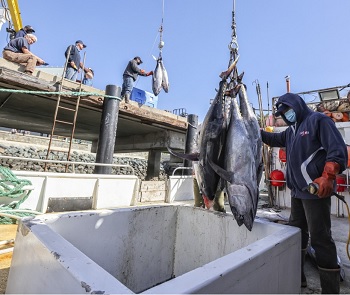
Selling Direct to the Public: What looked like disaster for Haworth Fish Co. has turned into new business
After a week at sea, Nick Haworth returned to port with 30,000 pounds of big eye tuna and opah aboard Kaylee H,,, Having been hundreds of miles offshore, the crew had not heard the news: On March 17, 2020, fearing a surge of coronavirus cases, the county health department shut down all indoor dining, instantly destroying the restaurant industry’s appetite for the fresh investment sitting on ice below deck in the fishing boat’s hold. “We had nowhere to sell our catch,,, photos, >click to read<,09:17
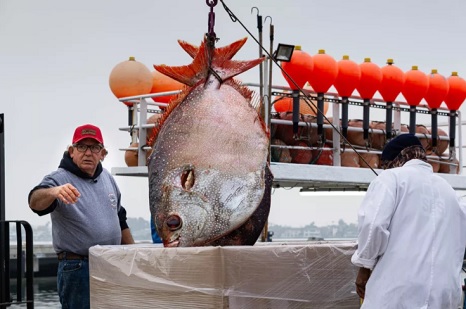
“The Fishmonger” Tommy Gomes to Star in TV Show and Open Point Loma Seafood Market
San Diego’s seafood culture, from its fishermen to the city’s chefs and restaurants, will be the subject of a new television show premiering Monday, March 1, on the Outdoor Channel. The Fishmonger stars local seafood expert Tommy Gomes, a native San Diegan and former commercial fisherman whose long career in the industry includes 15 years with Catalina Offshore Products, where he founded a walk-in fish market for the wholesaler and started a educational dinner series. >click to read< 08:50

Joseph Anthony Gann of San Diego has passed away
Joseph was born in the fishing port of Gloucester, Massachusetts, on December 19, 1925. He then moved to San Diego in 1926 at the age of one, with his parents Vincent and Nazare, and his two brothers Vincent and Edmond. Joe’s sister Lillian was born a few years later. His father built and operated a commercial fishing clipper.,, Joe then entered the fishing business with his brother Edmond and formed their company Caribbean Marine Service Co. Inc.; they soon became successful tuna-fishing fleet owners.,,, Joe went to congress to fight the 200-mile limit, and then in the 1970’s, along with Julius Zolezzi, he went to Samoa to facilitate the Fishing Treaty between the United States and Samoa. >click to read< 13:44
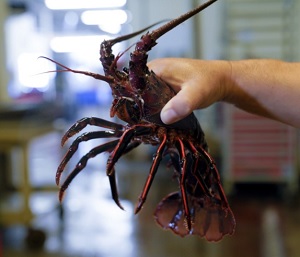
California Lobster season debuts amid changing seafood industry
It’s California spiny lobster season, from October through mid-March. Local fishermen and seafood retailers are celebrating its arrival, announcing the happy news that prices are the lowest in many years and the supply plentiful. What’s changed? In recent years, more than 95 percent of these well-loved California crustaceans were shipped to China, leaving only high-priced, limited quantities for local consumption. Rumors circulated that some fishermen were contemplating suspending operations, discouraged by their lost markets. Then, just as quickly, attitudes changed, as reality sank in. “People have to eat. If we don’t fish, what are people going to eat?” >click to read< 09:40
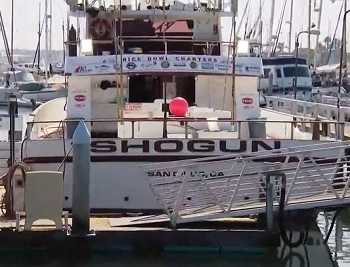
Four crew members on charter fishing vessel taken to area hospitals after suspected overdoses
San Diego Fire-Rescue responded to a call of multiple suspected overdoses on the fishing vessel Shogun near Fisherman’s Landing. Crews on scene administered Narcan to the four crew members who were then taken to hospitals in various states of consciousness. News 8 learned that two of the people were taken to Mercy Hospital, one to UCSD and it was unclear where the fourth was taken. The Shogun had just returned from a three-day fishing tour and no guests were on board when the suspected overdoses occurred. >video, click to read< 09:38
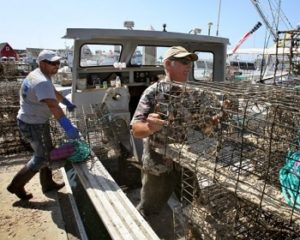
Fresh fish market proposed for Oceanside harbor to sell Seafood direct to consumers!
A group of local commercial fishermen hopes to create a weekly market at the Oceanside harbor where they could sell their catch directly to consumers. The idea sprang up as a result of the Coronavirus crisis, which closed sit-down restaurants everywhere. That greatly reduced the fishermen’s sales and left them looking for new outlets. Some of them decided to cut out the middleman and try selling their products to people at the harbor.,, Among the issues to be decided is whether the market will be overseen by a board of directors, elected by the fishermen, that would establish rules and guidelines for the venture,,, >click to read< 10:41
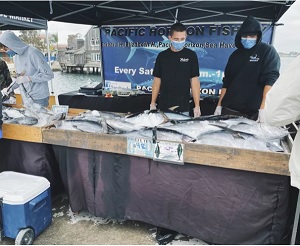
Coronavirus: San Diego’s Fishing Community Pivots to Stay Afloat
The COVID-19 shutdown of many of the city’s restaurants has left much of San Diego’s commercial fishing fleet reeling, and right now they’re doing everything they can to stay afloat including shifting the way they’re selling fish at the weekly Tuna Harbor Dockside Market, which has remained open as an essential business. “The commercial fishing fleet has always provided food for people and we’re still here,” says commercial fisherman Kelly Fukushima. “We want them to know they can rely on us to put food on people’s tables.” The crisis has been hard on local fishers. Commercial fishermen David Haworth and his son, Nick, had to scramble when wholesalers started calling them to say they could no longer sell their catch amid widespread restaurant closures. Home deliveries helped move the load of fish,,, >click to read< 15:31
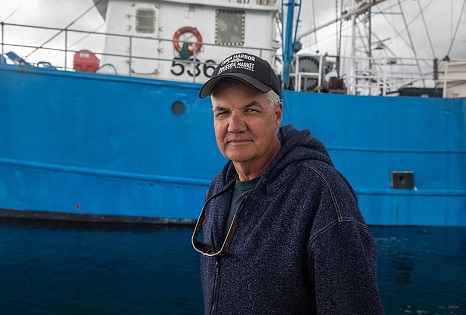
Coronavirus Slam California’s Commercial Fishermen, Including In San Diego
The true economic impact of the novel coronavirus is a long way from being determined, but it has likely already affected every industry in San Diego, including the one that helped define the region. “I think it’s going to get worse before it gets better,” said Tim Jones, a San Diego commercial fisherman for more than 30 years who is shutting down his operation to wait out the storm.,, Coronavirus isn’t the first thing to test the fortitude of San Diego’s commercial fishermen. Environmental restrictions, foreign competition and other factors eviscerated this once-thriving sector of the local economy beginning in the mid- to late-20th century. >click to read< 14:21
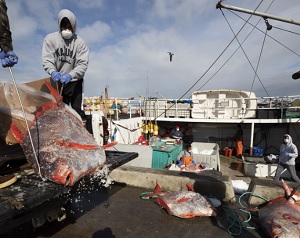
Coronavirus: Fishermen return from sea with a big catch and no place to sell
The coronavirus literally traveled over them from Asia to California while they were on the high seas catching tuna. They were as safe as anyone doing one of the most dangerous jobs, and now? Fishermen are returning home to California to find a state all but shuttered and nowhere to sell their catch. A handful of tuna boats filled with tens of thousands of pounds of fish are now floating off San Diego’s coast as they scramble to find customers. Many wholesalers stopped buying as restaurants were ordered closed except for takeout. photo’s, >click to read< 11:42
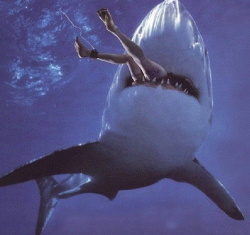
Mystery: One-time “Shark Capital of the World” Cape Town, South Africa has lost all of its “man-eating” Great Whites!
I’ve been so busy keeping up with the heaps and heaps of Great White sharks turning my once bucolic North County, San Diego paradise into a blood-curdling hell that I’ve not kept up with one-time “Shark Capital of the World” Cape Town, South Africa. The man-eating beasts were a constant threat for Afrikaans-speaking locals. Attacks were not uncommon and neither were deaths. Extremely scary but waters once teeming with ghastly teeth and rolled-back eyes are now peaceful. No Great White has been spotted in over eighteen months. >click to read< 14:57
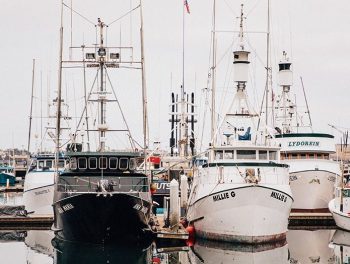
A little market, some big boats, and a $2 billion project are poised to revive San Diego’s commercial fishing industry
“The beginning was tough—they didn’t trust us,” says Yehudi “Gaf” Gaffen, CEO of Protea Waterfront Development, referring to San Diego’s fishermen and women. “For decades they’ve been discriminated against and business has been taken away from them. People take advantage of them.” Gaffen and his company have won the bid to redevelop the San Diego harbor. Their $2 billion “Seaport San Diego” plan will historically alter the future of the city’s waterfront—70 acres, to be almost exact. The fate of local fishers lies largely in his hands. And a little fish market on a little dock may be the reason both Gaffen and the fishers themselves are so keenly aware of their vital importance. >click to read< 17:35
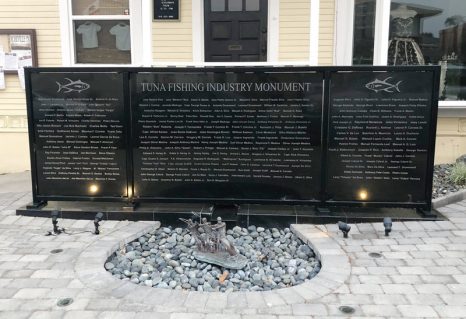
San Diego – Tuna fishing industry monument pays homage to those who served
Calling all past and present members of the tuna industry: It’s time to honor those who served in the industry with a plaque or paver at the Tuna Industry Monument in Point Loma. Located in the front of The Portuguese Historical Center since 2014, the large black monument made of granite pays homage to all those in the tuna industry. With about 85 names engraved on plaques, there is room for more to be added. >click to read<12:48
Most Lobsters Caught In San Diego Wind Up On Chinese Plates
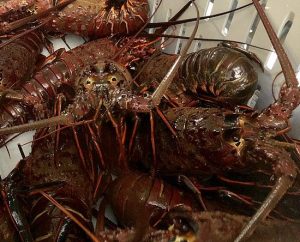 “Even a lot of people local don’t even really know we have this species of lobsters,” said Apex Wild Seafood owner David Schulken. “Because not that much of it gets sold here.” The price of a locally-caught spiny lobster is much higher than a Maine lobster imported from the East Coast. “Retail price for spiny’s is around $30 a pound,” Schulken said. “And retail for Maine lobster somewhere between $12 and $15 a pound.” Video>click to read<13:15
“Even a lot of people local don’t even really know we have this species of lobsters,” said Apex Wild Seafood owner David Schulken. “Because not that much of it gets sold here.” The price of a locally-caught spiny lobster is much higher than a Maine lobster imported from the East Coast. “Retail price for spiny’s is around $30 a pound,” Schulken said. “And retail for Maine lobster somewhere between $12 and $15 a pound.” Video>click to read<13:15
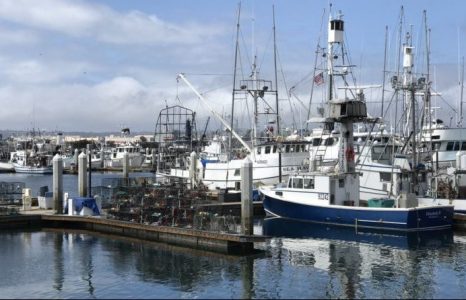
San Diego’s “Fishy” History: The Birth of Tuna Fisheries
Founding of the American Tuna Fishery – San Diego is often credited with birthing the American tuna fishery. The industry traces back to 1903, when a sardine packer in San Pedro switched to canning of albacore. “Consumers’ acceptance of canned tuna soon led to the development of fishing fleets in both San Diego and San Pedro,” a research paper published by the National Marine Fisheries Service (NMFS) in July 1978 stated. “San Diego became the major base for the fleet, a position it continues to hold [through 1978].” The first cannery opened its doors in 1909; the first tuna cannery arrived two years later. >click to read<13:31
Norton Sound: Arson ruled out, authorities trying to locate the owner
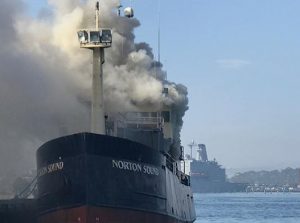 Authorities Thursday were still attempting to untangle a complicated web of ownership details linked to a fire-gutted boat that smoldered for several days over the weekend near Seaport Village in the San Diego Harbor, but investigators ruled out arson as the cause of the flames. What started the fire, which began Friday morning aboard the Norton Sound, was still undetermined Thursday, San Diego Fire-Rescue Department spokeswoman Monica Munoz said. The blaze was fully knocked down Sunday, but investigators were unable to probe its origins until mid-week. The next step in the clean-up effort will be to move the Norton Sound,,, But locating the owner has proven difficult. click here to read the story 15:04
Authorities Thursday were still attempting to untangle a complicated web of ownership details linked to a fire-gutted boat that smoldered for several days over the weekend near Seaport Village in the San Diego Harbor, but investigators ruled out arson as the cause of the flames. What started the fire, which began Friday morning aboard the Norton Sound, was still undetermined Thursday, San Diego Fire-Rescue Department spokeswoman Monica Munoz said. The blaze was fully knocked down Sunday, but investigators were unable to probe its origins until mid-week. The next step in the clean-up effort will be to move the Norton Sound,,, But locating the owner has proven difficult. click here to read the story 15:04
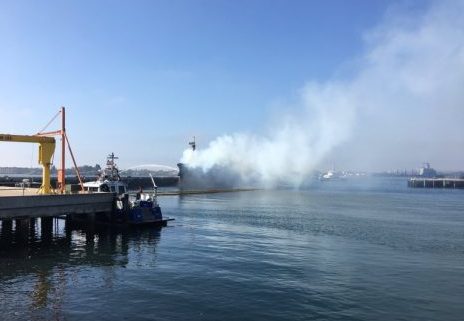
Fire-damaged fishing vessel in San Diego Harbor continues to smolder
A fire that tore through a docked commercial fishing and research ship near Seaport Village continued to smolder Saturday. The blaze initially erupted for unknown reasons inside the 120-foot Norton Sound at about 9:30 a.m. Friday. It was unclear if anyone was aboard the vessel when the fire broke out. Firefighters initially battled the flames from inside, finding no victims, but were ordered to pull out because of the intensity of the fire inside the boat after about a half-hour. The fire seemed to mostly burn itself out, then flared up again later in the day. The interior of the vessel continued to burn throughout Friday and into early Saturday. click here to read the story 15:01






